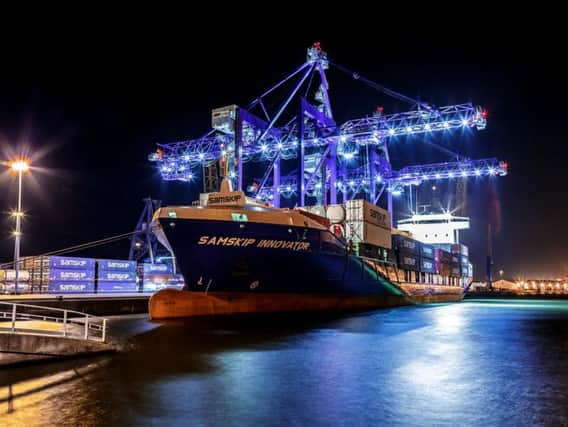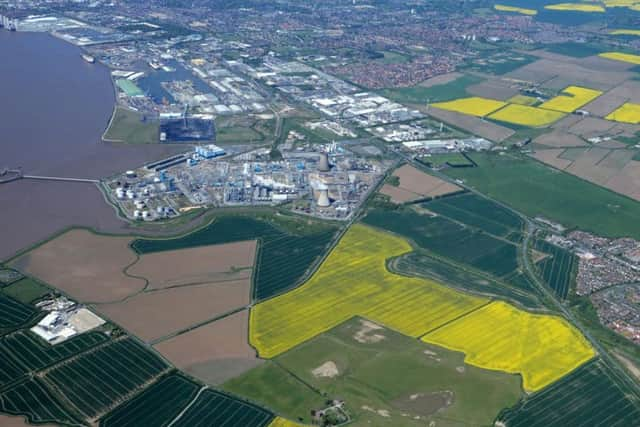How Port of Hull can be harbour from Brexit storm - and 'supercharge' northern economy


Ever since Theresa May announced in January that Britain would be leaving the Single Market and the Customs Union as part of the nation’s departure from the European Union, there has been growing alarm at the prospect of lorry queues stretching for miles at the nation’s busiest port in Dover with major knock-on effects for the nation’s economy as deliveries struggle to get in and out of the country if new systems are not up and running in time.
But while many in Kent are contemplating the increasingly-imminent arrival of Brexit with growing unease – particularly given the slow progress of negotiations which are yet to even start discussing future trade arrangements – there is cautious optimism in Humberside that it offers a unique opportunity for the region in the long-term.
Advertisement
Hide AdAdvertisement
Hide AdDover currently handles around 30 per cent of the UK’s trade with the EU. The extent of the nation’s reliance on Dover is such that a series of delays in 2015 caused by Operation Stack – in which stretches of the M20 were used to park lorries bound for Dover or the Channel Tunnel due to issues like migrant action in Calais or bad weather disrupting ferry services – cost the economy an estimated £250m per day.


In March this year, Port of Dover chief executive Tim Waggott warned the failure to agree new rules on the currently frictionless movement of goods between the UK and the EU could result in the type of delays caused by Operation Stack happening “every day of the year, in perpetuity”. However, for those at the rival Port of Hull there is some hope that Brexit offers the chance to rebalance the way the freight industry operates in this country.
The four Humber ports run by Associated British Ports (ABP) in Hull, Goole, Grimsby and Immingham already handle over 65 million tonnes of cargo every year. But David Leighton, head of corporate affairs at ABP, says there is now an opportunity for even greater use to be made of the region’s ports. While a lack of space at Dover means there is little room to expand its facilities to deal with the likely increase in customs bureaucracy, the Port of Hull has large areas of development land surrounding it.
“There has been considerable anxiety about disruption to trade through the Port of Dover if additional customs checks are introduced as a consequence of leaving the Customs Union,” Leighton says.
Advertisement
Hide AdAdvertisement
Hide Ad“However, a number of ports on the east coast are capable of offering customers robust and efficient alternatives for EU trade. These include ports on the Humber, which already serves as the Northern Powerhouse’s gateway to Europe. ABP is also working with a number of European ports which share our commitment to making sure trade between the UK and Europe can continue to flow and grow."


A policy paper published by ABP earlier this year said that in comparison with Dover, “crucially, many east coast ports have the space needed to accommodate additional customs checks if required and operate on routes where the risk of avoidable disruption to trade is arguably lower”. Leighton says ABP met extensively with senior Government ministers and officials to prepare for a full range of potential Brexit outcomes, including what would happen in a ‘no deal’ scenario.
But whatever happens, one thing ABP is pushing for is the creation of so-called ‘Free Ports’, which are considered to be outside the country for customs purposes and thereby allow goods to pass through without incurring the usual tariffs, in the UK. It follows a report by Yorkshire MP Rishi Sunak last year, who suggested establishing Free Ports would have the potential to create hundreds of thousands of new jobs.
Leighton says: “Rishi Sunak’s report points to the huge potential of Free Ports to attract investment in new world-leading manufacturing, helping to boost exports and re-balance the economy. The Port of Hull has large areas of development land close to deep water, ideal for the import of raw materials or components and export of finished products. A Free Ports policy could super-charge the prospects for regeneration and growth in Hull and across the Northern Powerhouse.”
Advertisement
Hide AdAdvertisement
Hide AdResearch is already under way on attracting more freight traffic to the north. The Logistics and Humber Development Institute at the University of Hull is currently involved in two projects designed to make a difference; the first called Capitals which is being trialled in the Humber and Liverpool and is designed to tackle congestion and delays around ports.


The second is the Liverpool - Humber Optimisation of Freight Transport project, which is working with major companies, rail freight firms and key port operators along the M62 corridor in a bid to increase the use of northern ports.
Professor Amar Ramudhin, director of the institute, says around half the cargo going through Dover currently is for businesses based to the north of Milton Keynes. “The biggest problem with freight in this country is it is unbalanced. A lot is travelling up the M1 and going into the Liverpool/Hull corridor. The best case scenario would be that the UK takes this exercise of Brexit and really makes some profound changes in freight movement so we don’t get bottlenecks in one place or another. Brexit could be used as an opportunity to finally change the way things are done.”
But Ramudhin says there are clear concerns about the considerable length of time it will take to establish a new customs system and it is vital there is an adequate transition phase to allow time for the new regulations to come into operation.
Advertisement
Hide AdAdvertisement
Hide Ad“We are in December 2017 and if you start today then add another two years, that is still very tough but it might be doable. The longer you wait, the bigger problem it is. I have worked with ports around the world and it just takes time for the systems to be implemented, it takes time for people to get used to the new regime.


"Two years is about the length of time it takes if you have a vendor in place who can come in and implement the system. But today we don’t know what processes will be in place and then we need to create the systems to cope with the new processes and volumes. It is not a simple task.
“It is a poker game with the EU. If the opposite side knows you want to stay in the customs union, they will bargain anything they can out of you.
“But if you were starting from scratch and not in the EU, your best end-game would be to have what we have today.”
Advertisement
Hide AdAdvertisement
Hide AdHe says ensuring the customs system - and with it the operation of the UK’s ports - runs smoothly is vital to the running of the British economy.
“In the trade supply chain, people are relying on continued supply, they have cut down inventories. Whereas people used to order once a month, now they order once a day. Instead of 30 days of inventory, they have just six hours or eight hours worth of stock. So a delay of more than half a day can have a major effect.”
Despite those caveats, Ramudhin says he is “cautiously optimistic” about the future. “I think this could be the greatest opportunity for the UK if we get this right. There are some very bright people in the UK and we have a long tradition of maritime and import/export. If we do it right and think about all the aspects of it and come up with a good system, that will eventually reap the rewards. However, if we don’t think it through and don’t do it right and just try a patchwork of stuff, it just won’t work."
Another organisation trying to get to grips with the huge implications of leaving the EU is the Freight Transport Association, which represents half of the UK’s fleet of good vehicles. James Hookam, deputy chief executive of the FTA, says businesses urgently need more clarity about trade and transport arrangements post-Brexit, with a well-planned transition period vital.
Advertisement
Hide AdAdvertisement
Hide AdIt is estimated that an additional 300 million customs declarations will need to be made in the UK each year, compared to the current 90 million. Hookam says: “The scale of this is truly enormous. Some 185,000 enterprises will be required to make customs declarations and other border checks after Brexit, for the first time in the UK.”
The FTA has produced a new report, “Ten Ways to Make Customs Borders Work after Brexit” which sets out practical steps to reduce delays at both sides of the border after Britain leaves the EU. Its proposals include ensuring no customs paperwork is presented at the border and processes are done digitally, while also improving the resourcing of border agencies to ensure they are able to effectively analyse data and target which vehicles are inspected.
One of the four key ‘freedoms’ of the single market is the free movement of goods between member states but before they can move between countries, conformity checks take place to ensure products meet EU standards.
Currently in the UK this takes place prior to the border but Hookam says the indications are this will end when Britain leaves the EU.
Advertisement
Hide AdAdvertisement
Hide Ad“By the time it gets to Holland or French customs, you don’t need to stop the vehicle. You don’t get conformity checks at Calais at all. All that ends on March 29, 2019. In all the conversations we have had with Michel Barnier’s taskforce, they have been adamant they will starting searching vehicles and checking them. There will be checks going into the EU and also for stuff coming out of the EU."
He says businesses are increasingly desperate for detail on how trade and customs will operate after Brexit.
“At the moment, all we know for sure is that we are coming out on March 29, 2019. Our members are beginning to negotiate new contracts that will be in place from 2019 and they have to price all this in. If they don’t offer a solution in the next few weeks, businesses will make its own mind up and decide it is going to be ‘no deal’ and assume the worst.”
Hookam agrees there is an irony in Britain’s departure from the EU customs union and single market increasing red tape for businesses in the UK given the years of complaints about alleged Brussels bureaucracy from leading Leave campaigners.
Advertisement
Hide AdAdvertisement
Hide Ad“That was our reaction when we heard the Prime Minister say we are coming out of the Customs Union. But the crucial thing is the Single Market as there is far more paperwork around conformity checks.
“Currently the reason for coming out is so we can do our own trade deals. That may yet come about. But it is not many businesses which deliberately make it more difficult to trade with existing customers so they can make up the shortfall with new customers. That is not a normal business strategy for success.”
But he does believe with the right arrangements in place, Brexit could offer a big opportunity for ports like Hull. However, with the Brexit deadline looming ever closer, whatever the long-term prospects for ports like Hull, the initial aim for those involved in the freight industry is rather more modest.
As Hookam told MPs on the Brexit Select Committee last week, “We just want to keep Britain trading.”
Concern over continental partners
Advertisement
Hide AdAdvertisement
Hide AdThe freight Trade Association says it is concerned about how well some EU nations are preparing for forthcoming changes to Britain’s customs system.
James Hookam says while he has been encouraged with the information he has heard about behind-the-scenes preparations in the UK, the same cannot be said for some in Europe. He says it has been a particular struggle to get the opinion of those involved in the French customs process.
“We are hearing very mixed responses as to the readiness of continental equivalents and our Irish equivalents. Even if Britain is ready at day one with a superbly frictionless processing system for all of this, if our trading partners aren’t ready, then we will face inevitable delays.”